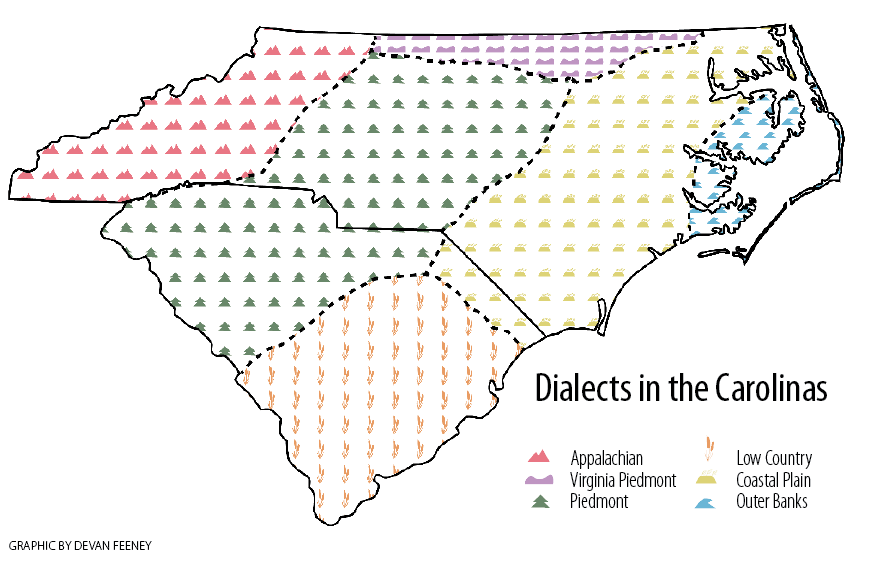Campus diversity tends to revolve around the inclusion of gender, race and sexual orientation but NC State’s campus diversity project want to add language to the discussion.
The linguistics program “Educating the Educated: A University-Wide Language Diversity Initiative,” which is led byStephany Dunstan, Walt Wolfram and Audrey Jaeger, holds events and workshops to expose issues of language-based inequality and create an inclusive campus environment for students.
“We wanted to do something on campus in terms of outreach in language diversity,” said Stephany Dunstan, the assistant director of the Office of Assessment. “It kind of got started when I was working on my dissertation, which explored the role of language for speakers of stigmatized dialects to understand how it influenced their college experiences.”
When diversity is talked about in higher education, culture is usually one of the topics discussed. Language can often be part of that umbrella term, but it’s not really talked about specifically, Dunstan explained.
The language diversity program started off with workshops for undergraduate students that taught them about dialects in North Carolina. It aimed to break common myths linked with language and dialect and then moved to graduate level courses.
“We thought, how can we reach the most people on campus? We really think this is something that’s important whether you’re a student, faculty, staff, administrator — you really ought to be aware of this kind of diversity, especially since so many myths abound, and a lot of them can be damaging,” said Dunstan.
The campus infusion model, created to guide the program, focuses on reaching students and faculty through student affairs, academic affairs, human resources, faculty affairs and the Office of Institutional Equity and Diversity.
For example, at the student affairs level, training has been provided to resident advisors and resident directors. The language diversity program also has a presence at Packapalooza, convocation and can be recognized by the “Howl with an Accent” posters.
The program also has a group of undergraduate and graduate student ambassadors who help facilitate the workshops and trainings across campus. The student ambassador program is open to anyone who is interested, and students can shadow experienced ambassadors at events to get a better understanding of how it works.
Issues that have been observed on campus and with students have brought the topic of language diversity to light. Dunstan said she had come across instances of dialect influencing their experience during her dissertation research.
“Some students mentioned that they didn’t like to speak up in class because sometimes other students would laugh at the way that they spoke,” Dunstan said. “I had seen that as an undergraduate student that someone might speak up and have a strong regional dialect, or maybe English wasn’t their first language, and you might hear some whispers and things like that.”
Language can be a point of interest between people to compare the different ways in which words are said. Although sometimes interactions related to language and dialect differences can be more negative. Dunstan said she encountered stereotypes on college campuses designating a ‘proper’ way to speak.
“The idea of ‘the dialect that you speak, the language that you brought to the campus that’s part of your culture and who you are is not what you should be using here’ … The kind of implicit message there that to be a scholar and sound scholarly for some students is that you might have to change that part of who you are. That can be kind of problematic,” Dunstan said.
To help individuals in the program’s workshops think critically about language-/dialect-based stereotypes and issues, participants are asked to imagine situations or certain characters and how they think they might sound.
For example, the individuals are asked to imagine that they are movie directors, and they can only portray the characters through their voices — how would you portray someone described as fancy, educated and posh? How would you portray someone as very uneducated to the audience?
Thinking through situations like these allows workshop participants to recognize how much people will judge others on the basis of their dialect and accents and encourages further thought on how these stereotypes are perpetuated in society.
“We want to make sure that everyone has a chance to learn that dialects vary greatly and that they all have equal value,” Dunstan said. “We think by doing that and kind of breaking some of these myths, we can level the playing field for acceptance along a lot of these other dimensions that we traditionally address in diversity canon.” One of the goals of the initiative is to get more students to think about language in terms of diversity and have them be able to talk about how language touches many parts of people’s lives. Expansion of this program is intended, and it is also a goal to make the program standard fare for orientation, Dunstan explained.
“We’d like to get a good representation of majors, because everybody is interested in language — just ask them ‘coke, soda or pop,’ and you can go on a five-minute conversation of what you say versus what I say,” Dunstan said.
Currently NC State is the only university in the United States that has a language diversity program, but other colleges have started to take interest in this approach.
“The University of Hawaii at Manoa — they saw our dialect video and said ‘This is great; would you care if we made one like this?’ and we said ‘Of course,’” Dunstan said. “We hope that it is not just NC State because this is a societal issue. We really hope that in higher education in general this is something that kind of diffuses.”








